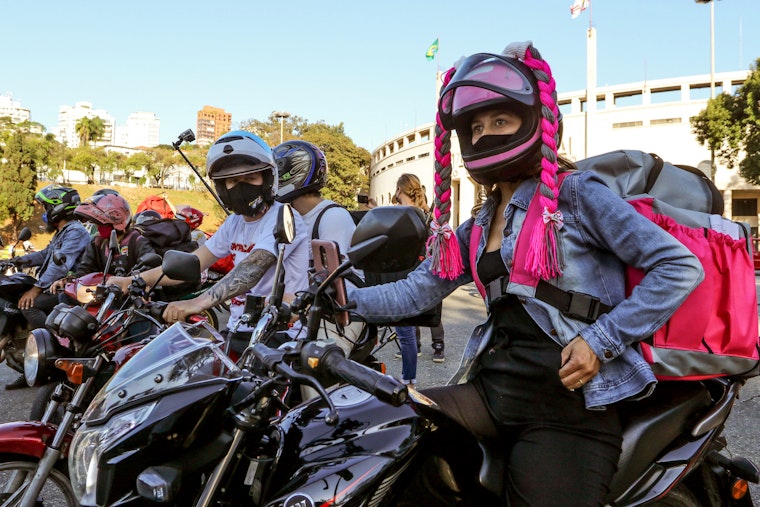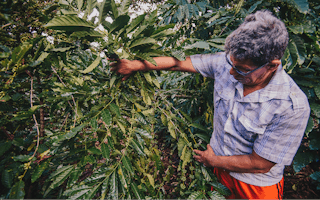Building Worker Power in Brazil
By Ana Valéria Araújo and Amanda Camargo

In Brazil’s labor market, racism, sexism, LGBTQIA+phobia, and ableism have always left some members of society out of the formal job sector and more vulnerable to work without minimum wage and maximum limits on working hours, social security, sick and maternity leave, retirement options, and on-the-job safety.
Rodrigo Lopes, president of the Union of Delivery Workers, Employees, and Independent Workers of Motorcycles and Bicycles for Apps in the State of Pernambuco (Seampabe), falls into this category. Throughout his more than 10-year career as a motorcycle delivery worker, he’s survived 12 accidents and faced any number of other dangerous situations.
“I’m a father. I have a family waiting for me at home. But every day when I leave for work, I’m not sure if I’ll come back,” he said. He says it's terrifying to be on the front line and witness the deaths of colleagues in the profession, while feeling legally unprotected himself.
The situation grew worse after 2017, when the conservative government of then-President Michel Temer sought to address Brazil’s economic crisis by reforming its labor code. This change, sold as an effort to make the labor market more flexible, led to more unregulated work on demand, unrestricted outsourcing; it has done anything but create fair outcomes for workers. “That’s why we have to keep fighting. It’s a complex battle, but we’ll face it with wisdom,” Lopes said.
The Brazilian Institute of Geography and Statistics reports that 39.1 million of Brazil’s 100.2 million workers are considered informally employed. According to Brazil’s National Household Sample Survey, an estimated 53.7 percent of Brazil’s Black population work in this sector. Of the total number of informal workers, 48.8 percent are women and an average of 63 percent are based in the North and Northeastern parts of the country. And while people with disabilities make up 8.9 percent of Brazil’s overall population, they represent just 1 percent of the country’s workforce.
As daunting as these data points are, we have a new grassroots initiative equipped to help individuals and non-governmental civil society organizations create fair and equitable labor conditions through policy and advocacy training and mobilization. The $8.5 million Labora—Decent Work Support Fund began two years ago as a joint philanthropic effort by the Open Society Foundations, the Brazilian Fund for Human Rights, the Laudes Foundation, and the Ford Foundation. It’s part of a larger effort that began in 2006 as the Brazil Human Rights Fund, with a mission to help communities address violations of human rights related to ethnicity, race, gender, sexuality, disability, and regional representation through meaningful civic engagement.
Labora uses this fund for a grant-making program called Strengthening Informal Workers in the Fight for Rights. Through this program, grassroots social justice organizations can submit proposals for building policy and advocacy campaigns for an intersectional labor movement. During last year’s call for proposals, we were able to give $1.7 million (R$7 million). This year, we plan to give about $530,000 (R$2.65 million).
The intersectional focus of this movement is key because in recent years, Brazil’s right-wing politics have returned to old union-busting tactics; stigmatizing and criminalizing collective bargaining by calling it an assault on workers. Challenges like these may have worsened under the right-wing administration of former President Jair Bolsonaro, but they didn’t exactly end with the re-election of the historically progressive President Lula da Silva. Inaugurated in January 2023, his first challenge was how to govern with a right-wing majority in Congress.
This is why the work Labora is doing right now is so important. We’ve funded and provided training and support to organizations in both urban and rural areas. Some are fighting for domestic workers, sex workers, gig workers, and workers with disabilities. Our goal is to foster a collective movement that can push the federal government to adapt policies that promote and integrate decent work and social and environmental justice issues.
During our first round of funding in late 2022, Labora provided grants to 25 projects. The organizations’ leaders used those resources to provide their workers with the grassroots policy and advocacy training our country so desperately needs. The effort led to some wonderful strategies for inclusive industrial design thinking, especially for delivery workers.
In June 2023, for example, Seambape used their grant to create a Secretariat for Women and LGBTQIA+, a move that attracted more than 200 workers to join the union. This secretariat provides female delivery workers with political training and professional qualification courses. They are invited to make a critical analysis of working conditions and the rights guaranteed under the Consolidation of Labor Laws and receive guidance on defensive driving and traffic legislation.
This effort has already led to the creation of new working standards. Until recently, bike delivery was seen as a male industry and hence the equipment was designed for a traditionally masculine physique, which left other workers dropping out of the profession or finishing their days in great physical pain. Now, Lopes says the gender-inclusive bags have become a symbol of the movement.
It is our hope that these grants can provide Seambape and many other labor organizations with the support they need to grow and foster a movement in which historically underserved workers feel legitimized and empowered with the training in politics and advocacy they need to be part of the decision making process at all levels of government and in all industries. By listening to these workers, we strengthen our ability to help even more workers on the front lines of social transformation and climate transition.
The Brazilian Fund for Human Rights and Labora are grantees of the Open Society Foundations.
Ana Valéria Araújo is executive director of the Brazilian Fund for Human Rights. Amanda Camargo is Labora’s project coordinator.


